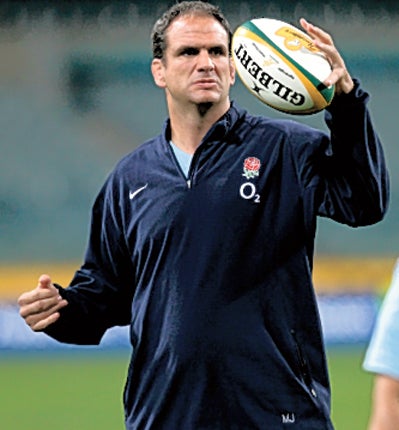Angry Johnson floored by rope-a-dope tactics

Your support helps us to tell the story
From reproductive rights to climate change to Big Tech, The Independent is on the ground when the story is developing. Whether it's investigating the financials of Elon Musk's pro-Trump PAC or producing our latest documentary, 'The A Word', which shines a light on the American women fighting for reproductive rights, we know how important it is to parse out the facts from the messaging.
At such a critical moment in US history, we need reporters on the ground. Your donation allows us to keep sending journalists to speak to both sides of the story.
The Independent is trusted by Americans across the entire political spectrum. And unlike many other quality news outlets, we choose not to lock Americans out of our reporting and analysis with paywalls. We believe quality journalism should be available to everyone, paid for by those who can afford it.
Your support makes all the difference.Steve Thompson, the England hooker who helped win a World Cup in Australia seven years ago, summoned memories of an older, even more glorious sporting landmark in the immediate aftermath of his side's deeply disappointing defeat on the banks of the Swan River.
"It was like the Rumble in the Jungle," he said, referring to Muhammad Ali's extra- ordinary victory over the world heavyweight champion George Foreman in 1974. "The Wallabies used rope-a-dope tactics in the scrums."
You could see Thompson's point. In the way Ali knew he could never out-thump Foreman in a month of Sundays, but might conceivably trick him into punching himself into exhaustion, the Australians worked out that while they were not in a position to stand up to England at the set-piece, they could absorb the worst of the punishment while leaving their opponents for dead around the field. Ben Daley, Saia Faingaa and Salesi Ma'afu were utterly useless in the tight, but their strong ball-carrying and committed tackling in the loose indicated that their approach had plenty going for it.
Unfortunately for Martin Johnson, the England approach had only one thing going for it, and it was nowhere near enough. The tourists created so little away from the bump and grind of the scrummage, particularly in a hideous opening half-hour, that their performance amounted to a passion-killer for the Western Australian audience, who tend to prefer Aussie Rules to rugby union anyway. Johnson was not remotely concerned with local sensibilities, but he was profoundly frustrated by his team's attacking impotence and defensive frailty.
"We gave them far too many shots at scoring," the manager said after treating his players to a serious piece of his mind after the game. "If you kick long and you don't chase well enough, the Wallabies will always beat people. We were off the pace in the first half and we put ourselves in a lot of trouble. We were better in the second half, but we're not going to be awarded two penalty tries every week. They were sharper than us, showed more composure and, as a result, we should be angry with ourselves. You have to be bloody good to win down here, but we had enough preparation time to be better than we were."
Johnson was particularly horrified by the torrent of missed tackles, which quickly put England on the back foot and kept them there for most of the opening half, during which the Wallabies scored two tries and butchered opportunities to score three or four more. "It's difficult to win if you miss 30 tackles, that's for sure," he said. "If you give yourselves a decent shot and get beaten, that's one thing. When you add to what the opposition do by making so many mistakes... well, that's another. We know what we're up against now and we have to react quickly."
The two sides meet again in Sydney – much more of a Wallaby stronghold than Perth – and it may be that the hosts will have a couple of injured world-beaters available to them. There again, they may not need them. The Australians, missing at least half of their first-choice side here, looked full of points despite the set-piece humiliations suffered by their rookie front row, and according to their coach, even the weakest part of their act will improve over the next few days.
"It's fair to say that our group will be better for that experience," said Robbie Deans. "That was this front-row unit's first taste of rugby at international level and they'll come out of it with a richer understanding of what Test union is about. It was a severe physical test for them, but for all the trouble they had in the scrums, they still had the energy to keep tackling in defence and the courage to keep playing with the ball." Which, in a different way, was precisely how Thompson described it. Clever, these Wallabies.
Join our commenting forum
Join thought-provoking conversations, follow other Independent readers and see their replies
Comments